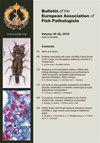First report of White Spot Syndrome Virus (WSSV) DNA in red swamp crayfish (Procambarus clarkii) in Germany
IF 1.1
4区 农林科学
Q4 FISHERIES
Bulletin of the European Association of Fish Pathologists
Pub Date : 2022-03-15
DOI:10.48045/001c.37059
引用次数: 0
Abstract
This work describes the first detection of WSSV genomic DNA in decapods introduced into Germany via food for human consumption. A batch of cooked, frozen, packed and labelled red swamp crayfish (Procambarus clarkii) was imported into an EU member state and subsequently moved to Germany. Some individual crayfish of this batch sampled as a labelled consumer package during an official routine food control showed signs of White spot disease at food inspection. To confirm the presence or absence of White spot syndrome virus (WSSV) DNA, PCR analysis was performed. All samples of affected red swamp crayfish tested positive for WSSV DNA. The food batch was immediately blocked by the competent veterinary authority and destroyed. Although the introduction of infectious WSSV into the EU could be ruled out this case indicates the risk of global trading and the importance of appropriate border controls in order to prevent the introduction of listed or emerging aquatic animal diseases via consignments of products of aquatic animal origin.德国红沼泽小龙虾白斑综合征病毒(WSSV)DNA的首次报告
这项工作描述了通过人类食用的食物引入德国的十足类动物中首次检测到的WSSV基因组DNA。一批煮熟、冷冻、包装并贴有标签的红色沼泽小龙虾(克氏原螯虾)进口到欧盟成员国,随后运往德国。在官方例行食物管制期间抽取的该批附有标签的消费包装中的个别小龙虾在食物检查时显示有白斑病的迹象。为确认白斑综合征病毒(WSSV) DNA是否存在,采用PCR分析。所有受影响的红沼泽小龙虾样本均检测出WSSV DNA阳性。该批食品立即被兽医主管部门封锁并销毁。虽然可以排除传染性水生生物病毒进入欧盟的可能性,但这一案例表明了全球贸易的风险以及适当的边境管制的重要性,以便防止通过水生动物来源的产品引入所列或新出现的水生动物疾病。
本文章由计算机程序翻译,如有差异,请以英文原文为准。
求助全文
约1分钟内获得全文
求助全文
来源期刊
CiteScore
1.20
自引率
0.00%
发文量
19
审稿时长
>12 weeks
期刊介绍:
The Bulletin of the EAFP is an international peer-reviewed journal that publishes concise papers which merit rapid publication by virtue of their interest in the field of fish and shellfish pathology. Preliminary observations or partial studies are also acceptable, if adequately supported by experimental details. Short reviews, methodology papers and papers proposing alternative hypotheses based on previous data can be considered.

 求助内容:
求助内容: 应助结果提醒方式:
应助结果提醒方式:


